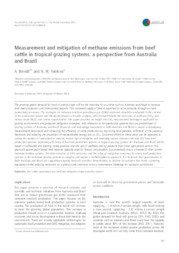Measurement and mitigation of methane emissions from beef cattle in tropical grazing systems: a perspective from Australia and Brazil.
Measurement and mitigation of methane emissions from beef cattle in tropical grazing systems: a perspective from Australia and Brazil.
Author(s): BERNDT, A.; TOMKINS, N. W.
Summary: The growing global demand for food of animal origin will be the incentive for countries such as Australia and Brazil to increase their beef production and international exports. This increased supply of beef is expected to occur primarily through on-farm productivity increases. The strategies for reducing resultant greenhouse gas (GHG) emissions should be evaluated in the context of the production system and should encompass a broader analysis, which would include the emissions of methane (CH4) and nitrous oxide (N2O) and carbon sequestration. This paper provides an insight into CH4 measurement techniques applicable to grazing environments and proposed mitigation strategies, with relevance to the production systems that are predominant in grazing systems of Australia and Brazil. Research and technology investment in both Australia and Brazil is aimed at developing measurement techniques and increasing the efficiency of cattle production by improving herd genetics, utilization of the seasonal feed-base and reducing the proportion of metabolizable energy lost as CH4. Concerted efforts in these areas can be expected to reduce the number of unproductive animals, reduce age at slaughter and inevitably reduce emission intensity (EI) from beef production systems. Improving efficiency of livestock production systems in tropical grazing systems for Australia and Brazil will be based on cultivated and existing native pastures and the use of additives and by-products from other agricultural sectors. This approach spares grain-based feed reserves typically used for human consumption, but potentially incurs a heavier EI than current intensive feeding systems. The determination of GHG emissions and the value of mitigation outcomes for entire beef production systems in the extensive grazing systems is complex and require a multidisciplinary approach. It is fortunate that governments in both Australia and Brazil are supporting ongoing research activities. Nevertheless, to achieve an outcome that feeds a growing population while reducing emissions on a global scale continues to be a monumental challenge for ruminant nutritionists.
Publication year: 2013
Types of publication: Journal article
Keywords: Greenhouse gas, Mitigation, Tropical grazing systems, beef cattle, methane
Observation
Some of Embrapa's publications are published as ePub files. To read them, use or download one of the following free software options to your computer or mobile device. Android: Google Play Books; IOS: iBooks; Windows and Linux: Calibre.
Access other publications
Access the Agricultural Research Database (BDPA) to consult Embrapa's full library collection and records.
Visit Embrapa Bookstore to purchase books and other publications sold by Embrapa.

